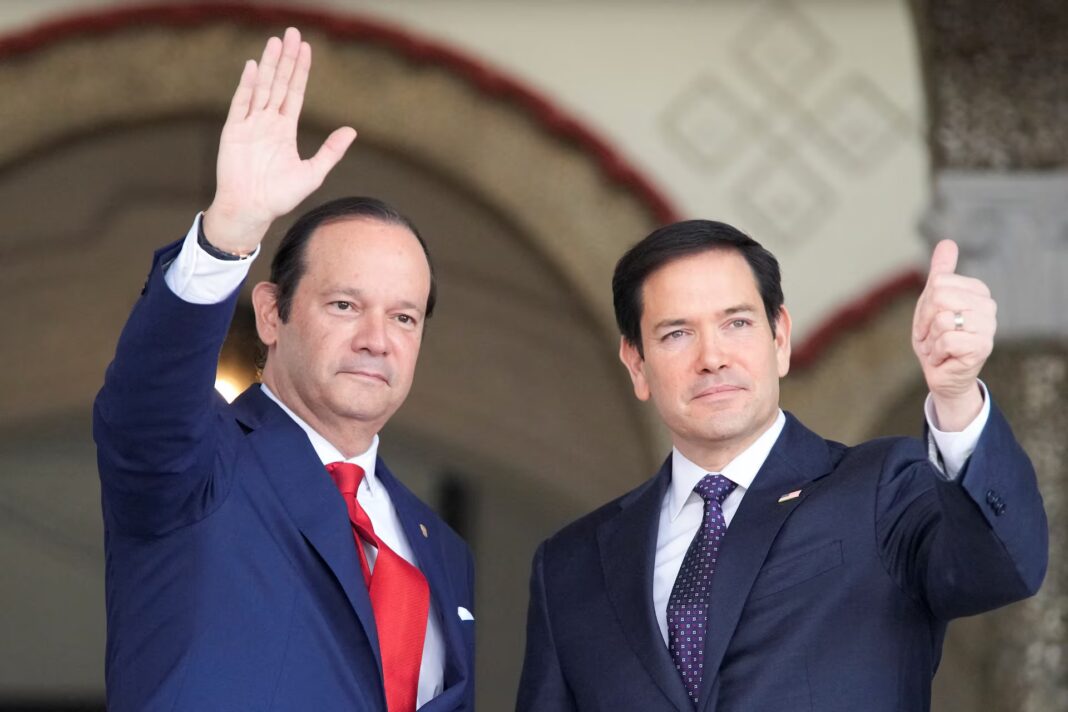Tensions Rise Over Control of Panama Canal
The United States has issued a strong warning to Panama regarding China’s influence over the Panama Canal. During a high-level visit to Panama City on Sunday, U.S. Secretary of State Marco Rubio told Panamanian President Jose Raul Mulino that Washington would take action if immediate steps were not taken to curb China’s presence. President Donald Trump has expressed concerns that China’s involvement in the canal poses a threat to U.S. national security and global trade.
Rubio conveyed Trump’s message, emphasizing that Chinese control over ports near the canal entrances violates the long-standing U.S.-Panama treaty. The U.S. insists that China’s activities in Panama could lead to geopolitical instability, potentially restricting access to the vital trade route.
China’s Presence in the Canal Sparks U.S. Concerns
China has increased its economic and logistical presence in Panama, including the management of two key ports through a Hong Kong-based company. While Beijing insists it does not control the canal, Washington believes China’s growing influence could be a strategic risk.
Rubio warned that if China decided to close the canal during a conflict, it would have severe consequences for global shipping and U.S. security. Trump has stated that Panama violated the original agreement and that the U.S. has a right to reclaim control over the canal. Although he did not explicitly say military force would be used, he did not rule out strong retaliatory actions.
Panama Defends Sovereignty, Signals Cooperation
Despite the pressure from Washington, President Mulino reaffirmed Panama’s sovereignty over the canal. He made it clear that the issue of control over the waterway was non-negotiable. However, he agreed to review existing agreements involving Chinese companies, particularly a 25-year port concession granted to Hong Kong-based CK Hutchison Holdings.
Mulino also announced that Panama would reconsider its participation in China’s Belt and Road Initiative, a massive global infrastructure project. He suggested that the agreement could be terminated early, signaling a shift in Panama’s foreign policy.
Trump’s Threats Raise Global Concerns
Trump’s comments on potentially reclaiming control of the canal have sparked international debate. The Panama Canal was built by the U.S. in the early 20th century and remained under American administration until it was handed over to Panama in 1999. Trump believes that the U.S. made a mistake in giving up control and argues that China is now exploiting that decision.
His threats have drawn criticism from various Latin American nations, who see the possibility of U.S. intervention as a violation of Panama’s sovereignty. However, Trump maintains that his primary concern is protecting American interests and ensuring that China does not gain strategic control over such an important trade route.
U.S. Strengthens Regional Ties to Counter China
Rubio’s visit to Panama is part of a broader U.S. strategy to counter China’s growing influence in Latin America. During his tour of Central America and the Caribbean, Rubio has met with regional leaders to discuss economic partnerships, security cooperation, and migration policies.
The U.S. is particularly focused on securing stronger alliances with countries that have economic ties to China. Washington wants to ensure that China does not gain further control over key infrastructure projects in the Western Hemisphere.
Panama Expands Cooperation on Migration
Beyond the issue of the canal, Panama has also agreed to expand its cooperation with the U.S. on migration issues. Mulino announced that Panama would work with the U.S. Department of Homeland Security to facilitate the return of migrants from Venezuela, Colombia, and Ecuador.
A new agreement will allow deportation flights from the U.S. to use airstrips in Panama to return migrants to their home countries. The goal is to curb the growing number of migrants traveling through the dangerous Darien Gap, a jungle region between Panama and Colombia that has become a key route for people trying to reach the U.S.
China Dismisses U.S. Allegations
China has rejected the U.S. claims that it has any control over the Panama Canal. A spokesperson from China’s Foreign Ministry stated that Beijing fully respects Panama’s sovereignty and that the canal remains a neutral international waterway.
China insists that its investments in Panama are purely economic and not part of a larger geopolitical strategy. However, the U.S. remains skeptical, viewing China’s growing economic ties with Latin America as part of a broader effort to challenge American influence in the region.
What’s Next?
Rubio’s visit and Trump’s escalating rhetoric suggest that tensions over the Panama Canal will continue to grow. While Panama has signaled willingness to review its agreements with China, it remains firm on its sovereignty.
The situation is likely to impact U.S.-Panama relations and could lead to further economic and political shifts in the region. Whether Trump takes further action remains to be seen, but his administration has made it clear that it will not tolerate what it sees as Chinese interference in the Western Hemisphere. As the geopolitical battle over the Panama Canal unfolds, the world will be watching closely to see how both Washington and Beijing respond.

